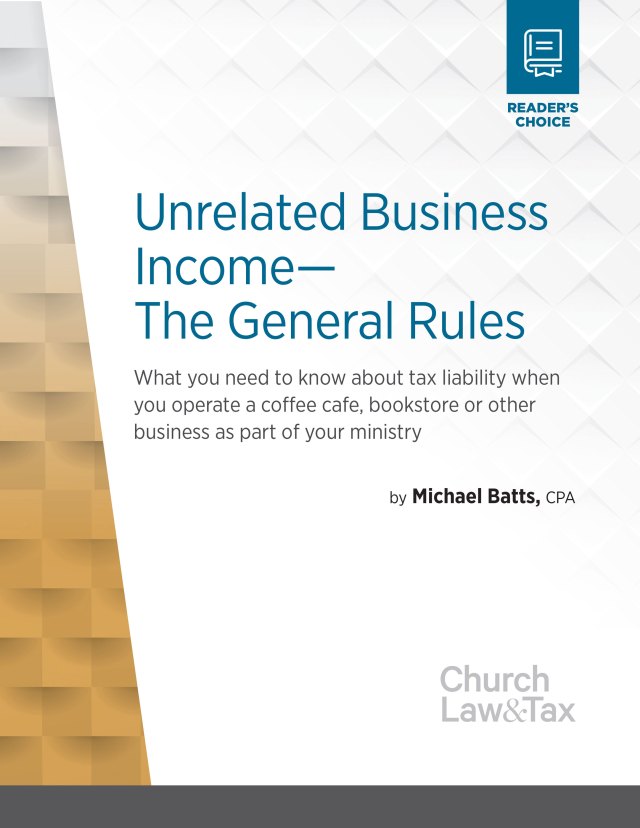Prior to 1950 a growing number of tax-exempt organizations were engaged in profitable business activities in competition with taxable organizations. In some cases these business activities had little or no relation to the exempt organization’s purposes other than the production of revenue to carry out those purposes.
This led Congress, in the Revenue Act of 1950, to impose a tax—the unrelated business income tax (“UBIT”)—on the “unrelated business income” of certain exempt organizations. The Act exempted certain organizations from the unrelated business income tax, including churches and conventions or associations of churches.
It soon became apparent that many of the exempted organizations were engaging in unrelated businesses. For example, churches were involved in publishing, hotels, factories, radio and television stations, parking lots, newspapers, bakeries, and restaurants.
Congress responded in the Tax Reform Act of 1969 by subjecting almost all exempt organizations, including churches and conventions or associations of churches, to the tax on unrelated business income. As a result, for taxable years beginning after 1969, churches and conventions or associations of churches are subject to the tax on unrelated business income.
Section 512 of the tax code defines unrelated business taxable income as:
“the gross income derived by any organization from any unrelated trade or business regularly carried on by it” less certain deductions. Section 513 defines the term “unrelated trade or business” as “any trade or business the conduct of which is not substantially related (aside from the need of such organization for income or funds or the use it makes of the profits derived) to the exercise or performance by such organization of its charitable, educational, or other purpose or function constituting the basis for its exemption under section 501.”
According to these provisions the following three conditions must be met for an activity of an exempt organization to be classified as an unrelated trade or business and the gross income of such activity subjected to the tax on unrelated business taxable income:
- the activity must be a trade or business;
- the trade or business must be regularly carried on; and
- the trade or business must not be substantially related to exempt purposes.
IRS Letter Ruling 201024069 shows how these conditions were used to reach the conclusion a church did not owe taxes.
The Case
A church employee designed a database management software program for his church within the scope of his employment. Quite unexpectedly, several other churches learned of the program and wanted to use it, and for-profit entities began making inquiries about purchasing it.
The church treated the program as a work for hire since it was created by its employee within the scope of his employment. As a result, the church assumed that it owned the copyright in the work.
The church decided to sell its intellectual property rights in the program to a for-profit company for a one-time cash payment, reserving for itself a perpetual license to use the program at no cost.
Following the sale of the intellectual property rights in the program, the church had no further duties in developing the program, and the sales agreement prohibited the church from engaging in any further development relating to the program except as a user.
The church was concerned that the sales price it received from the sale of the software might be subject to the unrelated business income tax. As a result, it asked the IRS for a private letter ruling addressing the application of UBIT to the sales proceeds.
In its ruling request the church represented that it did not plan to engage in the future sale of computer software; the sale of the intellectual property rights in the program was a one-time only transaction; and the sale of intellectual property rights to computer software will not be an on-going income producing activity.
The church asked the IRS to confirm that income it received from the sale of the intellectual property rights in the software did not constitute unrelated business income and therefore was not subject to unrelated business income taxes.
The IRS ruling
The IRS began its ruling by observing:
Section 511 [of the tax code] imposes a tax on unrelated business income of … tax-exempt organizations. Under section 512, unrelated business taxable income includes gross income derived from an unrelated trade or business activity or transaction that a tax-exempt organization carries on regularly. Further [the regulations specify that] income derived from an activity is unrelated business taxable income, if the activity (1) is a trade or business; (2) is regularly carried on; and (3) is not substantially related to the tax- exempt organization’s exercise or performance of its tax-exempt functions or purpose, a three part test. The activity must meet all three tests before income from the activity is taxable under section 512.
The IRS proceeded to apply each of these requirements to the facts of this case.
Trade or business
Did the church’s sale of its intellectual property rights in the software program constitute a trade or business? The IRS noted that the income tax regulations specify that “any activity carried on for the production of income from the sale of goods or the performance of services, is a trade or business.” The IRS concluded that “because you earned income from the sale of the entire intellectual property rights…you performed or carried on a trade or business.”
Regularly carried on
Only income from a trade or business that is regularly carried on is subject to the unrelated business income tax. Did the church meet this requirement? The IRS said no:
[The income tax regulations] define “regularly carried on” to mean a trade or business activity frequently and continuously pursued by a tax-exempt organization in a manner generally similar to comparable commercial activities of non-exempt organizations .… our sale of the intellectual property rights is not a continuous and consistent income producing activity because you performed or carried on this activity once. You have not developed and sold intellectual property rights to computer software in the past. Further, the sales agreement restricts you from further developing the software. Finally, you represent that you do not plan to engage in the future sale of computer software; that the sale of the intellectual property rights was a one-time only transaction; and that the sale of intellectual property rights to computer software will not be an ongoing income producing activity by you. Thus, your sale of the intellectual property rights failed to meet the second test of [the definition of unrelated business taxable income].
Not substantially related to an exempt purpose
The third element in the definition of unrelated business taxable income is that the income-generating activity is not substantially related to the tax-exempt organization’s exempt purposes.
The IRS noted that income from an activity is taxable as unrelated business income if the activity meets all three elements of the definition of unrelated business taxable income. It concluded:
“Because your sale of the intellectual property rights did not meet the [regularly carried on] test, though it met the trade or business activity test, it is not necessary for us to continue with the consideration on whether your sale of the software is not substantially related to your tax-exempt purpose. Having failed one of the tests…the income from your sale of the software is not taxable.”
Relevance to church leaders
Churches that elect to retain the copyright in a work for hire can sell the work, typically for a lump sum or the payment of royalties. In either case, the church may be required to pay the unrelated business income tax and file the annual UBIT form (Form 990-T) with the IRS.
The church involved in the IRS ruling summarized in this article chose to retain the copyright in the work for hire created by one of its employees, and sold the rights in the work to a for-profit company for a lump sum amount in lieu of royalties. According to the IRS, this did not trigger the unrelated business income tax since it was a one-time sale that did not satisfy the “regularly carried on” element of the definition of unrelated business income.
What if the church had chosen to receive periodic royalties in lieu of a lump sum amount as a result of its sale of the work to the for-profit company? The tax code specifies that royalties, like rents, capital gains, and interest and dividends, ordinarily are not subject to the unrelated business income tax unless financed with borrowed money (an “acquisition indebtedness”).The unrelated business income tax is addressed fully in chapter 12 of Richard Hammar’s annual Church & Clergy Tax Guide.


